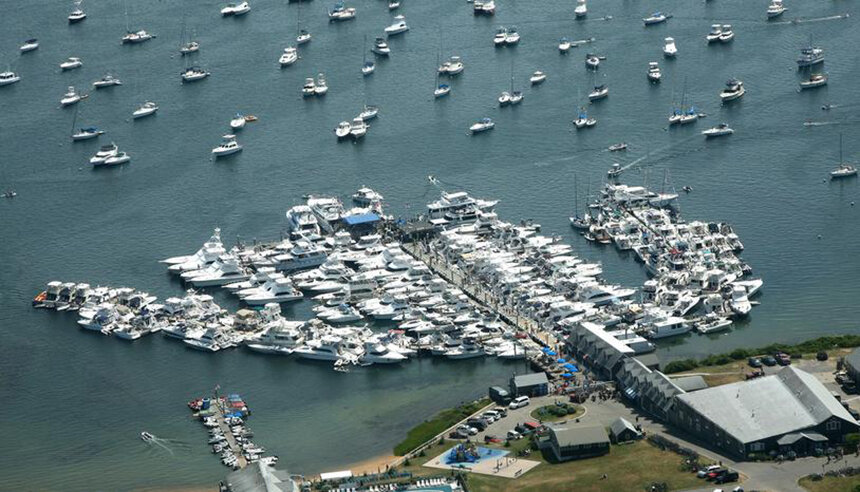Supreme Court Blocks Marina Expansion Agreement
By ecoRI News staff

The secret deal between Champlin’s Marina & Resort and the Coastal Resources Management Council would have expanded the facility’s footprint by 1.5 acres. (Committee for the Great Salt Pond)
Earlier this month Rhode
Island Attorney General Peter Neronha asked the state Supreme Court to reject
the agreement to expand Champlin’s Marina & Resort on Block Island.
The court responded March 26, rejecting, in an unsigned order, the proposed settlement to the controversial expansion that had been reached by the marina and the Coastal Resources Management Council (CRMC).
The agreement was
brokered by retired Supreme Court Chief Justice Frank J. Williams last December
during an executive session of the CRMC board. CRMC has declined to comment on
the action, and there is no public record of what occurred during the
closed-door deliberations.
The surprise mediated settlement granted approval to build 170 feet into Great Salt Pond — a sensitive tidal lagoon under pressure from summer boaters in need of dock space in the crowded 800-acre body of water.
The 1.5-acre expansion also called for extending the
fuel dock 85 feet to a length of 314 feet, building a parallel 314-foot-long
dock that would connect to the fuel dock with a 156-foot-long dock, and
creating additional space for parking.
Neronha said he was
pleased with the court’s decision “to refuse to ratify and enter as an order of
the Court an agreement resulting from a private mediation outside the view and
without the participation of concerned stakeholders who had long been parties
to the underlying litigation.”
“My Office intervened because the process utilized here by the CRMC and Champlain’s was non-transparent, excluded these important additional stakeholders, and resulted in an agreement that failed to contain the environmental findings necessary to protect one of Rhode Island’s great natural resources — Block Island’s Great Salt Pond,” he wrote in a press release soon after the court’s decision.
In asking the Supreme
Court to reject the agreement,
Neronha accused CRMC of abandoning the environmental protections it set a
decade ago when it denied the marina’s expansion.
The legal fight between CRMC, Champlin’s Marina, the town of New Shoreham, and environmental groups began in 2003, when a proposal to nearly double the marina’s size was announced. CRMC denied the application in 2006. Champlin’s appealed to Superior Court, where the decision was reversed.
Opponents appealed to Supreme Court,
which asked Superior Court and CRMC to review the decision. In 2013, CRMC
denied the expansion again. Champlin’s appealed. Last February the Supreme
Court upheld CRMC’s decision.
Dyana Koelsch,
spokesperson for Champlin’s attorney, Robert Goldberg, noted that while the
court declined to issue the consent order, “saying the Supreme Court was
not the appropriate place for the requested action,” it’s important to
note the court didn’t dispute the legitimacy of the settlement.
“This case has been
languishing in litigation for 17 years, and Champlin’s along with CRMC are
committed to finally settling it,” Koelsch wrote in a press release. “The mediated settlement
involves significant concessions from Champlin’s that resulted in an expansion
plan that is one third of what was originally proposed.”
The marina was sold Dec.
23, 2020, less than a week before the mediation agreement was signed.
Champlin’s Realty Associates Limited Partnership’s general partner, Champlin’s
Realty Associates, Inc., sold the marina and adjacent properties for $25
million to Great Salt Pond Marina Property LLC, a unit of Cranston-based
Procaccianti Companies.
The new owner of the
marina has said the previous owner, Joseph Grillo, is representing himself in
the litigation. The Procaccianti Companies operates the marina as a new
subsidiary, TPG Marinas.
The March 26 decision
means Champlin’s appeal will likely be heard by the full court in the coming
months.